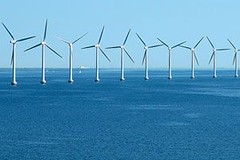
The basis of our American experiment in democracy has always been predicated on following the will of the majority while respecting the positions of the minority. As a recent Mother Jones article (Cape Wind Delay a Big Win for Dirty Energy Interests) points out, the democractic process has been turned on its ear by an unlikely alliance of oil and gas interests with a group of Native Americans who are looking to define an entire body of water as a national historic site, blocking the construction of the Cape Wind Project on Nanucket Sound.
Journalist Kate Sheppard notes:
The tribes surely have perfectly sound reasons of their own for opposing the project. "We are hoping...that we can protect the sound and our religious right to worship the rising sun and be able to pass that tradition on to our grandchildren," Green said. "The government has not honored many of the things it has promised to the Native American people...All we have is the process, and all we've asked for is due process."
That's clearly a consideration for the Department of Interior, which oversees NPS. To that end, the Interior Department recently issued a new tribal consultation policy, a long overdue effort to improve the agency's relationship with tribes.
But in the case of this particular decision on Cape Wind, granting this level of preservation to an entire body of water could be a bad omen for all future offshore wind development. Barring development here, Cape Wind president Jim Gordon told Mother Jones recently, "would have a chilling effect on what could possibly be one of the most promising sources for energy independence and creating a new green economy."
The forces aligned against renewable energy use every tactic imagineable to derail progress on the alternative energy front. In this case, the majority of the residents of Massachusetts, the state legislature, the state's congressional delegation, and the Governor, Deval Patrick, are solidly behind the Cape Wind project. The opposition is small, well-funded, and determined--undettered by what their opposition means to the future of energy development or the absolute necessity to reverse global warming. In this particular scenario, democracy isn't working very well at all.